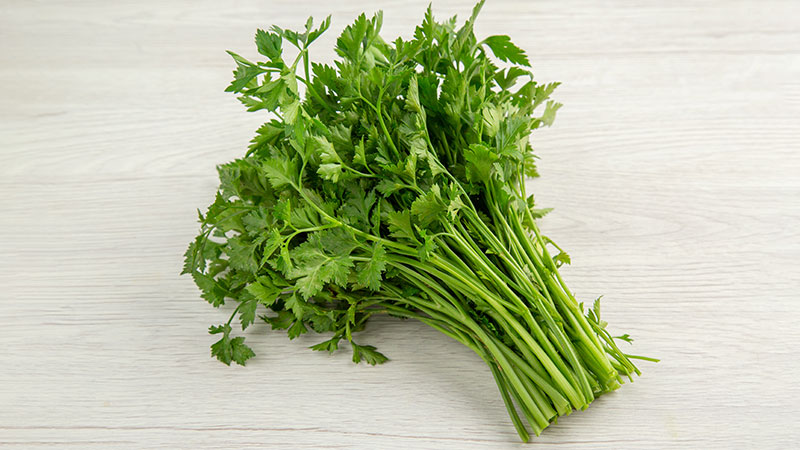
Cilantro isn’t just a flavorful addition to your meals; it’s a powerhouse of nutrients that can significantly boost your health.
Packed with antioxidants like terpinene, quercetin, and tocopherols, along with essential vitamins A and C, cilantro strengthens immunity and offers neuroprotective and anticancer benefits.
These properties make cilantro a valuable component of a balanced diet, supporting overall wellness.
Research shows that cilantro promotes heart health by lowering blood pressure and cholesterol while balancing blood sugar levels.
Starting your day with cilantro water can enhance digestion and metabolism, aiding in weight loss. Also, its antimicrobial compounds effectively fight harmful organisms like Salmonella, and cilantro assists in detoxifying the body by removing toxic metals.
Whether sprinkled over a dish or blended into a smoothie, cilantro’s versatility makes it easy to incorporate its numerous health benefits into your daily routine.
Nutritional Value
Cilantro is a nutrient-dense herb, low in calories and rich in essential vitamins. A quarter cup (4 grams) provides:
| Nutrient | Amount | % Daily Value |
|---|---|---|
| Calories | 1 | — |
| Carbohydrates | 0.1 g | — |
| Protein | 0.1 g | — |
| Fiber | 0.1 g | — |
| Vitamin K | 12.4 µg | 16% |
| Vitamin A | 270 IU | 5% |
| Vitamin C | 1.1 mg | 2% |
| Vitamin E | 0.1 mg | 1% |
| Folate | 2.5 µg | 1% |
| Potassium | 20.8 mg | 1% |
12 Health Benefits of Cilantro

Cilantro, also known as coriander, is a versatile herb celebrated not only for its culinary uses but also for its numerous health benefits. Here are 12 health benefits of cilantro:
1. Eliminates Heavy Metals from the Body
Cilantro, scientifically known as Coriandrum sativum, effectively binds toxic metals such as arsenic, cadmium, aluminum, lead, and mercury.
This process loosens these metals from body tissues, promoting their elimination. Studies demonstrate that cilantro reduces lead-induced oxidative stress in animal models and accelerates heavy metal removal in humans.
By eliminating these toxins, cilantro helps mitigate risks of heart disease, hormonal imbalances, neurological disorders, and infertility.
2. Shields Against Oxidative Damage
Cilantro features quercetin, a potent flavonoid with strong antioxidant properties. These antioxidants neutralize free radicals, protecting the body from oxidative stress.
An in vitro study confirmed that Coriandrum sativum guards cells against oxidative damage. By combating oxidative stress, cilantro helps prevent degenerative diseases such as cancer, heart disease, and Alzheimer’s, enhancing overall health and cellular integrity.
3. Alleviates Anxiety
Cilantro has natural sedative properties that calm nerves and improve sleep quality. An animal study published in the Indian Journal of Pharmacology found high levels of cilantro extract produce the same anti-anxiety effects as valium (diazepam).
Unlike valium, it doesn’t cause confusion, hallucinations, or memory problems. This herb provides anxiety relief and better sleep without dangerous side effects, making cilantro a safe and effective alternative for managing anxiety and enhancing mental well-being.
4. Reduces Blood Sugar Levels
Cilantro effectively lowers blood sugar levels, as demonstrated in animal studies. Research published in the Journal of Food Sciences shows that Coriandrum sativum supports healthy liver function and balances blood sugar in diabetic subjects.
Also, coriander seed extract decreases blood sugar similarly to medications like glibenclamide. By promoting enzyme activity that removes sugar from the blood, cilantro aids in managing diabetes.
However, individuals taking diabetes medications or with low blood sugar should use cilantro cautiously.
5. Promotes Heart Health
Research indicates cilantro reduces several heart disease risk factors. An animal study demonstrated that cilantro lowers cholesterol and triglyceride levels.
Also, a study published in Food and Chemical Toxicology found the herb’s polyphenols and cardioprotective nutrients prevent oxidative damage linked to heart damage.
By addressing cholesterol levels and protecting against oxidative stress, cilantro supports overall heart health effectively.
6. Prevents Urinary Tract Infections
Cilantro’s antibacterial compounds keep the urinary tract healthy by inhibiting bacterial growth. Maintaining an alkaline environment reduces infection risks linked to genetics, diabetes, or sexual activity.
Drinking a solution made from soaked coriander seeds alleviates UTI symptoms, easing discomfort and speeding healing.
For example, soaking 1.5 teaspoons of dried seeds overnight in two cups of water offers a natural remedy. Alternatively, adding coriander seeds to a morning smoothie provides ongoing protection against unhealthy bacteria.
7. Eases Digestive Discomfort
Cilantro settles nauseous tummies by promoting digestive enzyme production. It prevents gas and bloating, offering relief from indigestion and heartburn.
Adding cilantro to hot and spicy dishes introduces cooling effects that mitigate stomach cramps. Many enjoy cilantro as a garnish for legume dishes and salads, effectively reducing digestive discomfort.
This herb supports efficient digestion, making meals more enjoyable and easier on the stomach.
8. Guards Against Foodborne Illness
Cilantro safeguards against foodborne diseases with its natural antibacterial properties. Research in the International Journal of Food Microbiology shows cilantro effectively fights Listeria monocytogenes, the bacteria causing listeriosis.
Also, it combats various food and waterborne pathogens, reducing the risk of food poisoning and dysentery.
By incorporating cilantro into meals, individuals enhance food safety and protect their health through its potent antimicrobial effects.
9. Supports Menstrual Health
Cilantro regulates endocrine function, balancing hormones essential for menstrual cycles. It reduces bloating, alleviates cramps, and eases pain during periods.
Coriander seeds maintain proper hormone levels, supporting healthy menstrual function. Also, cilantro’s anti-inflammatory properties lessen discomfort associated with menstruation.
Incorporating cilantro into the diet enhances menstrual health naturally, providing relief and promoting overall well-being during the menstrual cycle.
10. May Offer Colon Cancer Protection
Studies indicate cilantro may protect against colon cancer. Its antioxidants, including quercetin and terpinene, neutralize free radicals that harm colon cells.
Also, cilantro’s anti-inflammatory properties reduce chronic inflammation, a significant risk factor for colon cancer.
Populations consuming cilantro-rich diets exhibit lower colon cancer rates. Regularly incorporating cilantro into meals supports colon health and may decrease cancer risk.
11. Reduces Neurological Inflammation
Cilantro’s strong anti-inflammatory properties effectively lessen neurological inflammation. Antioxidants like quercetin and terpinene in cilantro combat oxidative stress within the brain.
This reduction in inflammation supports overall brain health and may decrease the risk of neurodegenerative diseases.
Regularly including cilantro in meals promotes a healthier nervous system and enhances cognitive function.
12. Calms Skin Irritation
Cilantro treats skin irritations like hives, sunburns, and poison ivy. Its natural antihistamines calm the immune response to allergens.
Blending fresh cilantro with coconut oil creates a soothing topical remedy for dry skin and allergic hives.
Alternatively, blending cilantro with water, straining, and applying the liquid while drinking the juice offers comprehensive relief. This dual application method effectively mitigates allergic reactions and promotes skin health.
How to Incorporate Cilantro into Your Diet?

Enhancing meals with cilantro introduces both flavor and health benefits effortlessly. Here are several ways to include this versatile herb in your daily diet.
Coriander Parathas
Coriander parathas blend whole wheat flour with fresh cilantro, creating a nutritious and tasty flatbread. Incorporating a quarter cup of chopped cilantro into the dough adds vibrant flavor while keeping calorie intake minimal.
Coriander Dal
Boost your dal by adding a tablespoon of chopped cilantro just before serving. This simple addition enhances the dish’s taste and increases its antioxidant properties, supporting overall immune health.
Coriander Juice
Prepare a refreshing coriander juice by blending half a cup of cilantro leaves with water and a squeeze of lemon. Drinking this juice daily aids in detoxification by binding and removing heavy metals from the body.
Dips and Spreads
Enhance dips like guacamole or hummus by mixing in a quarter cup of finely chopped cilantro. This not only enriches the flavor but also provides essential vitamins without adding extra calories.
Potential Side Effects
Cilantro, also known as coriander, is a widely used herb in various global cuisines. While it provides several health benefits, consuming it in excessive amounts may lead to side effects.
Gastrointestinal Issues
Consuming excessive cilantro may cause stomach upset. Individuals might experience diarrhea or abdominal discomfort. Those with sensitive digestive systems should monitor their intake carefully.
Allergic Reactions
Some people develop allergic reactions to cilantro. Symptoms include itching, swelling, or rash. Severe cases may lead to anaphylaxis, requiring immediate medical attention.
Skin Sensitivity
Applying cilantro topically can irritate the skin. It may cause redness or itching in sensitive individuals. Testing a small area first can prevent widespread reactions.
Breathing Problems
Inhalation of cilantro particles may trigger respiratory issues. Individuals with asthma or other lung conditions should use caution. Exposure can lead to difficulty breathing or exacerbated symptoms.
Chest Pain
Rarely, cilantro consumption may result in chest pain. This side effect requires prompt medical evaluation. Individuals experiencing chest discomfort should seek professional healthcare advice immediately.
Conclusion
Cilantro stands out as a versatile herb that enhances both flavor and health. Its rich nutrient profile and powerful antioxidants make it a valuable addition to any diet.
By supporting heart health, aiding digestion, and promoting detoxification cilantro offers numerous benefits for overall wellness.
Incorporating cilantro into daily meals is simple and rewarding. Whether added to salads, smoothies, or cooked dishes cilantro not only elevates the taste but also boosts nutritional intake. Embracing this herb can lead to improved health outcomes and a more balanced lifestyle
